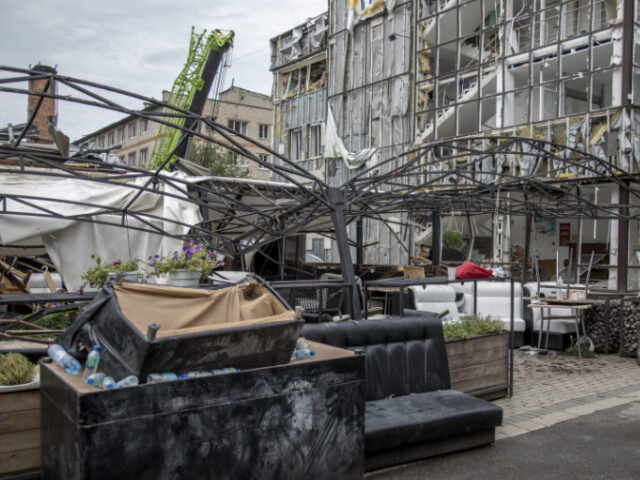The Russian Embassy in Bogotá, Colombia, issued a statement on Wednesday chastising three Colombian nationals for being present this week at a pizzeria in Donetsk, occupied Ukraine, which Russia bombed, suggesting the Colombians seek a more “appropriate” place to “savor Ukrainian cuisine.”
On Tuesday, Russian forces bombed Kramatorsk, Donetsk, one of two regions of the eastern Donbas region of Ukraine. Russian strongman Vladimir Putin “annexed” both Donbas regions, Donetsk and Luhansk, in September, along with two other eastern territories, Kherson and Zaporizhzhia, claiming the colonization necessary to fight Nazism and gender ideology.
Moscow confirmed that it had conducted strikes over Kramatorsk following the initial reports. On Wednesday, a Defense Ministry spokesman claimed that the airstrikes had targeted a deployment site for the Ukrainian military and destroyed multiple battalion observation posts as well as a rocket depot. The Russian news agency Tass, citing the regime of strongman Vladimir Putin, reported on Friday that the airstrikes killed two Ukrainian generals, “up to 50” Ukrainian fighters, and 20 “foreign mercenaries.”
In reality, the airstrikes bombed a pizzeria in the city and killed 11 civilians, including children, according to the U.K.’s Sky News. Eyewitnesses identified an infant among the 61 people injured as of Wednesday and three teen children among the dead, 14-year-old twin girls and a 17-year-old boy. Ukrainian media shared images on television and online of the remains of the restaurant:
Sky News reported that the Russian military struck the pizzeria with a surface-to-air missile, obliterating it. Later reports indicated that a short-range ballistic missile hit the restaurant. The restaurant was reportedly popular with Ukrainian soldiers and officials, potentially resulting in the Russians targeting it.
“Russia doesn’t hit civilians only military targets,” Kremlin spokesman Dmitry Peskov told Sky News. Tass reported Peskov similarly insisting that Russia had not targeted a civilian location and would never do so.
Among the injured were three Colombian citizens: former Colombian High Commissioner for Peace Sergio Jaramillo, journalist Catalina Gómez, and writer Héctor Abad Faciolince. The three were in the country, the Colombian magazine Semana reported, supporting a campaign titled “Resist, Ukraine,” to raise awareness of the ongoing existence of the conflict, which has been met largely with apathy in Latin America. Semana reported that the three sustained light injuries.
Radical leftist President Gustavo Petro, who had previously refused to condemn Russia for invading Ukraine, issued a statement on Wednesday condemning Moscow for harming his citizens and vowing a formal protest.
“Russia has attacked three defenseless Colombian civilians. In this way it has violated the protocols of war,” Petro, a former member of the M-19 Marxist terrorist guerrilla, wrote on Twitter. “The Foreign Ministry will issue a formal diplomatic note of protest. We are looking forward to the safe and sound return to their homes of Sergio, Héctor, and Catalina”:
The Foreign Ministry subsequently condemned the attack in a press release on Wednesday.
“The Foreign Relations Ministry expresses its most energetic condemnation against the unacceptable attack on the part of Russian forces on a civil target in Kramatorsk, Ukraine, in which Colombian citizens Catalina Gómez, Sergio Jaramillio, and Héctor Abad Faciolince were affected,” the Ministry asserted. “Solidarity with them, with the fatal victims and their relatives, as well as other people affected, among them writer Victoria Amelina.”
“After learning of the events, through a message sent by the ex-High Commissioner for Peace, Foreign Minister Álvaro Leyva Durán extended a greeting to the three Colombian citizens expressing his concern, solidarity, and wishes for a swift recovery,” the statement concluded.
The formal rebuke does not appear to have resulted in any policy changes in the relationship between the far-left Petro administration and Russia. Semana, the Colombian magazine, noted that “no official has come out to reject the actions of the government of Vladimir Putin” beyond that message as of Wednesday.
Petro has refused to condemn Russia explicitly as the aggressor in the Ukraine war in the past. In May, asked about Ukraine, Petro railed against America’s Operation Just Cause, a military operation against Panamanian dictator Manuel Noriega in 1989.
“You have an England that invades the [Falkland Islands, a territory the U.K. has possessed since 1833]. You have a United States that has invaded Santo Domingo [Dominican Republic, in 1916], that has invaded Grenada, that has invaded Panama which, for the Colombian people, is a historical fact that has not been overcome,” Petro responded to a question about Russia and Ukraine.
The Russian embassy in Bogotá issued a statement, also via its Twitter account and in Spanish, appearing to blame the Colombians for their injuries.
“We found out with much lament about the events in Kramatorsk,” the embassy said in a statement. “In our judgment, the city near the [war] front, turned into an operational and military logistics hub, is not an appropriate place to savor dishes from Ukrainian cuisine.”
The message went on to say that, “of course,” Moscow was “happy that for the citizens of [Colombia] lightly injured that that imprudent trip did not become an irreparable tragedy.”
“We insist on representatives of the friendly Colombian people abstaining from visiting territories and sites of belligerent actions,” the embassy concluded:
The quip about Ukranian cuisine notably did not appear in the English-language translation of the message as reported by Tass.
Donbas has been at war for at least nine years, since Russia illegally colonized Ukraine’s Crimean peninsula, and has been the site of some of the most gruesome atrocities of the conflict, most prominently the shooting down of Malaysia Airlines Flight 17, a commercial airliner, by a Russian missile in 2014.

COMMENTS
Please let us know if you're having issues with commenting.